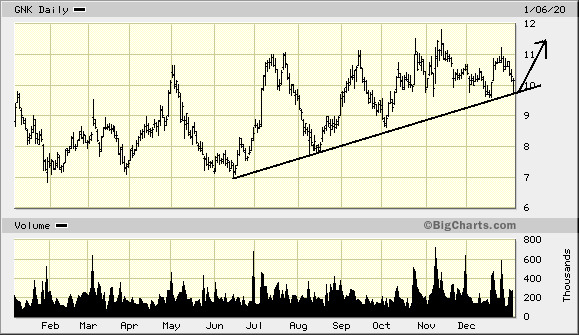As I have been predicting for months, the IMO 2020 rules have disrupted the global fuel market. These new rules went into effect on January 1, 2020 and have mandated the reduction of sulfur used in marine fuel.
This has created chaos in fuel pricing.
High-sulfur fuel oil prices have collapsed, as HSFO (3.5% sulfur, or bunker fuel) is now illegal unless the ship is equipped with scrubbers. HSFO prices will stay weak. This will benefit shipping companies that went through the costly process of adding scrubbers.
Very low-sulfur fuel oil (bunker with 0.5% sulfur) has increased in price and is now on par with gasoil (MGO 0.1% sulfur). VLSFO is the new standard for ships.
According to S&P Global:
The VLSFO-HSFO spread in Singapore is some $340 per metric tonne (p/mt) – the third highest level since low sulphur fuel became widely available. The spread between low sulphur marine gasoil and high sulphur fuel oil, at $346 p/mt, is the highest level since 2014.
Translating the VLSFO-HSFO spread into shipping terms, a ship burning 20 metric tonnes of fuel per day will effectively double its daily fuel costs from $7,400 per day to $14,200 per day when switching from HSFO to VLSFO.

Suppliers are pushing up prices for LSFO as demand increases. In many locations, supplies remain tight. This in turn means shipping companies will have to pass on prices to consumers.
Freight rates are going up, and the global markets have yet to price it in.
Our analysts have traveled the world over, dedicated to finding the best and most profitable investments in the global energy markets. All you have to do to join our Energy and Capital investment community is sign up for the daily newsletter below.
Genco Is a Winner
One winner of this sea change will be Genco Shipping & Trading (NYSE: GNK), the largest U.S. dry-bulk shipping company, specializing in transporting iron ore, coal, grain, steel products, and other goods.
While some 75% to 80% of the shipping industry will have to pay up for LSFO, companies like GNK can buy the cheaper HSFO.
This is because Genco has installed scrubbers on all of its ships before the IMO 2020 rule came into effect. The company also has a 6.59% dividend yield.

Coming off a brutal five-year recession in the shipping industry where share prices dropped 90%, many shipping company stocks have doubled over the last year and are still just climbing off the bottom. This trend has room to run.
But GNK isn’t my favorite play in the sector. Click here for the best way to play it.
All the best,

Christian DeHaemer
Christian is the founder of Bull and Bust Report and an editor at Energy and Capital. For more on Christian, see his editor’s page.

